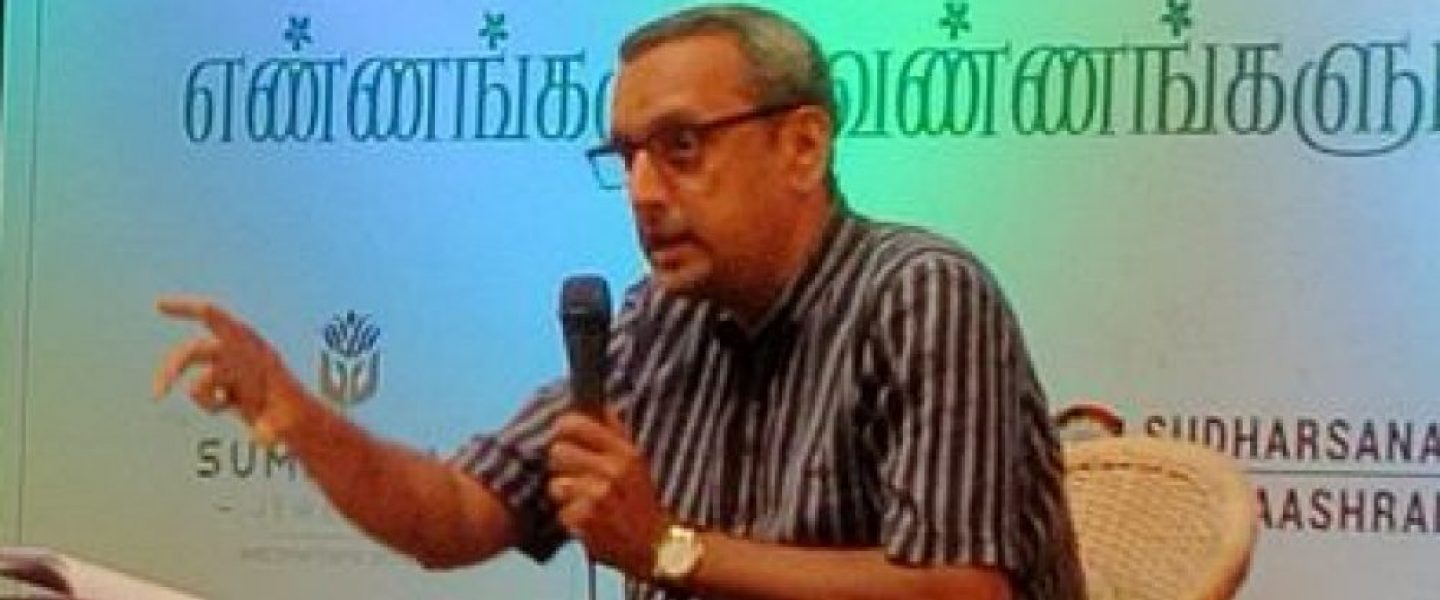நீங்கள் இடதுசாரி முற்போக்கு வாசகராக இருந்தால் மேலே வாசிக்க வேண்டாம். மனம் புண்படும். அப்புறம் உங்கள் இஷ்டம்.
சுமங்கலித் தன்மைக்கான அடையாளங்கள் எதுவும் இல்லாத பெண் பேராசிரியர், தனது இடது சாரித்தனம் தோய்ந்த பெண்ணீயக் கருத்துகளைத் தன் கல்லூரி மாணவர்களுக்குப் போதித்து, அவையே ஆதர்ஸம் என்று நம்ப வைத்தால் என்ன ஆகும் ? என்ன மாதிரியான விளைவுகள் ஏற்பட சாத்தியங்கள் உள்ளன ? அந்த மாணவர்களும் தனது பேராசிரியரையே பின்பற்றி அவர் சொன்னவையே வேதவாக்கு என்று பாரதீயப் பாரம்பரிய வழிமுறைகளை வேண்டும் என்றே உதாசீனப்படுத்தினால் அவர்களது குடும்பங்கள் என்ன ஆகும் ? இந்தப் பின்புலத்தில் இந்திய அரசியல் சட்டங்கள் என்ன சொல்கின்றன, அவை நடைமுறையுடன் மாறுபடும் இடங்கள் யாவை ? அவற்றால் ஏற்படும் பிறழ்வுகள் என்று பல தளங்களைத் தொட்டுச் செல்கிறது ‘பிளவு’ நாவல்.
ಕವಲು ( Kavalu ) என்று கன்னடத்தில் எஸ்.எல்.பைரப்பா 2010ல் எழுதிய நாவல் ‘பிளவு’ என்னும் பெயரில் தமிழில் மொழிபெயர்க்கப்பட்டுள்ளது. கன்னடப் பெயரின் நேரடிப் பொருள் Cross Roads என்று தெரிகிறது. ஆனால், தமிழில் ‘பிளவு’ என்கிற பெயரில் உள்ளது இன்னும் பொருத்தமாகவே உள்ளது. ஏனெனில், நாவலின் கரு அப்படியானது.
பெண் பேராசிரியரின் நடவடிக்கைகள், அவரது கொள்கைகள், அவரது வெளி உலகத் தொடர்புகள் முதலியவற்றால் அவரது குடும்பம் சென்று சேறும் இடம் என்று ஒரு கதை செல்கிறது. அப்பேராசிரியரின் கொள்கைகளால் முழுவதுமாகக் கவரப்பட்ட மாணவியின் கல்லூரி வாழ்க்கை, பின்னர் அவர் வேலைக்குச் செல்வது, அதன் பின்னரான அவரது குடும்ப வாழ்க்கை முதலியவை பற்றிய இரண்டாவது கதை. பேராசிரியரின் கணவர், மாணவியின் கணவர் என்று அவர்களின் வாழ்க்கையைப் பற்றிய மூன்றாவது கதை. இவற்றுடன் இந்திய, மேற்கத்திய வாழ்க்கைகளின் ஒப்பீடுகள் என்று ஊடுறுவிச்செல்லும் நாவல் இலக்கியத் தரமான ஒன்றா என்று கேள்வி கேட்க இடங்கள் உள்ளன. ஆனால், நாவல் எழுப்பும் கேள்விகள் முக்கியமானவை.
குறியீடுகள் என்று பெரிதாக இல்லை என்றாலும், நாவல் காட்டும் தரிசனமானது, நமது இந்திய முற்போக்காளர்கள் மீதும், நவீனப் பெண் போராளிகள் மீதும் பாய்ச்சும் வெளிச்சம் என்பதே. பாரதீயப் பண்பாட்டை அழிக்க வேண்டி நமது கல்லுரி அமைப்பு, அதன் கல்வித்துறைத் தலைவர்களின் கொள்கைகள், அவர்களை இயக்கும் அமைப்புகள், முற்போக்கு மாதர் சங்கங்கள் போன்ற போர்வையில் சமூகத்தில் நஞ்சை விதைக்கும் பெண்கள் அமைப்புகள் என்று பல இடங்களை வெளிச்சப் பாய்ச்சலுக்கு ஆளாக்குகிறது ‘பிளவு’ நாவல்.
நாவலில் முறை தவறிய உறவுகள் உள்ளன. அந்த முறை தவறிய உறவுகள் என்பவை பெண்ணீயத்தின் ஒரு விழுமியம் என்கிற பார்வையை இடதுசாரிக் கல்லூரிப் பாடங்கள் மூலமாக நமது மாணவர்கள் கண்டடைகிறார்கள் என்பதைச் சுட்டிச் செல்கிறது நாவல்.
குடும்பப்பாங்கான பிள்ளைகள் கல்லூரிகளுக்குச் சென்று, நவீனத்துவம் என்கிற போர்வையில் பெறும் இடதுசாரிச் சிந்தாந்தக் கல்வியால் தங்களின் பாரம்பரிய அடையாளங்களை இழந்து நிற்பது பெண்ணீயம், நவீனத்துவ நோக்கு என்கிற பார்வையைப் பெறும் அவலம் நேரடியாகச் சொல்லப்படும் இடங்கள் நிகழ்கால நிதர்ஸனங்களைக் காட்டுவதை உன்னிப்பான வாசகன் கவனிக்கத் தவற மாட்டான்.
பாரதத்தின் அடித்தளமே குடும்பம் என்னும் கூட்டு தான். அடிப்படையான கட்டமைப்பு குடும்பம். அந்தக் குடும்பம் என்னும் ஆதாரம் தன் உறுப்பினர்களுக்குக் கொடுப்பது பண்பாடு என்னும் வலிமையை. அத்தகைய பாரதீயப் பண்பாட்டின் ஊற்றில் வளரும் குடும்பப் பெண் / ஆண், பாரதம் என்னும் பெரும் கலாச்சாரக் கட்டமைப்பின் தவிர்க்க முடியாத அங்கத்தினன் ஆகிறான். அவன் தனது பண்பாட்டுப் பயிற்சியினாலும், தீவிர ஆன்மீகத் தேடல்களாலும் பாரதம் என்கிற வியத்தகு கட்டமைப்பின் வலுவை உறுதி செய்கிறான்.
பாரதம் என்கிற தேசத்தின் ஆன்மாவாக ஆகும் மேற்சொன்ன குடும்ப உறுப்பினன், தன் கல்லூரிப் பேராசிரியப் பதர்களின் இடதுசாரிப் பார்வை விஷ வீச்சால் தனது பாரதீயத் தனத்தை இழப்பது அவ்வளவு எளிதானது அல்ல. ஆகவே, முதலில் அவனிடம் / அவளிடம் சொல்லப்படுவது : உன் பண்பாட்டு அடையாளங்களை விட்டொழி. பெண்ணானால் குங்குமம் வைக்கதே. கூந்தலை வாரிப் பின்னல் போடாதே. காது, மூக்கு, கழுத்து, கை என்று எதிலும் எந்த அணிகலனும் அணியாதே. இவ்வாறு இவற்றை நிராகரித்தால், நீ பெண் என்பதால் உன் மிது போடப்பட்ட கலாச்சாரத் தளைகளை உடைத்து எறிய முடியும். நீ விடுதலை பெறலாம்.
மேலும், திருமணம் என்னும் பந்தம், அதில் வேறு நாடுகளில் இல்லாத அளவிற்குப் புனிதத் தன்மையை ஏற்படுத்துவது என்பனவும் ஒரு பெண்ணை எப்போதும் அடிமையாக வைத்திருக்க வழி வகுக்கும். ஆகவே, திருமணத்திற்குப் பின்னரே பாலுறவு, கணவனுடன் மட்டுமே பாலுறவு என்கிற கட்டுகள் பெண்ணை எப்போதுமே சங்கிலியால் பிணைத்த ஒரு மூச்சு முட்டும் அளவிற்கான சிறையே. ஆகவே, திருமணம் தவிர்த்து, லிவிங் டுகெதர் என்கிற வழிவகையானது, பெண்ணையும் ஆணையும் தேவையற்ற திருமணம் என்கிற பந்தத்தில் இருந்து காப்பாற்ற உதவி செய்யும்.
இம்மாதிரியான சிந்தனைகள் வசப்படும் பெண் / ஆண் மாணவர்கல் பாரத தேசத்தின் ஆன்மாவைப் பிளவுபடுத்தி, பாரத கலாச்சாரத்தை வேறோடு அழிக்க கருவிகளாக மாறிப் போகிறார்கள்.
இந்த விஷயங்கள் நேரடியாக இல்லாமல், கதையின் ஊடாகச் சொல்லப்பட்டுள்ள நாவல் ‘பிளவு’.
தமிழகத்திலும் ஈ.வெ.ராமசாமி நாயக்கர் பெண்கள் குறித்து ‘பலகாரக் கடையில் தின்பண்டங்களைத் தேர்ந்தெடுப்பது போல் பெண்கள் தங்களுக்குத் தேவையான ஆண்களைத் தெர்ந்தெடுக்க வேண்டும்’ என்னும் பொருள்படப் பேசியுள்ளது நினைவிற்கு வரலாம்.
நாவலில் முறையற்ற பாலுறவு குறித்த விவரங்கள் வருவது, மரபு சார்ந்த வாசகர்களுக்கு சிறிய அளவிலான பாதிப்பை ஏற்படுத்தலாம்.
நாவல்: பிளவு. ஆசிரியர்: எஸ்.எல்.பைரப்பா. தமிழில் : ஜெயா வெங்கட்ராம். சுவாசம் பதிப்பகம். விலை ரூ: 420. http://www.swasambookart.com











 ‘ Cab driver stories’ is such a book that would bring to the fore, the hidden world of cab drivers.
‘ Cab driver stories’ is such a book that would bring to the fore, the hidden world of cab drivers.
 The collection is multi-ethnic, has multi-lingual characters and is a multi-national one – multi-national literally. Author Jayanthi Sankar doesn’t treat the reader as a child that needs constant and repetitive chiding or instruction. She doesn’t tell stories, but shows the events in their kaleidoscopic splendour.
The collection is multi-ethnic, has multi-lingual characters and is a multi-national one – multi-national literally. Author Jayanthi Sankar doesn’t treat the reader as a child that needs constant and repetitive chiding or instruction. She doesn’t tell stories, but shows the events in their kaleidoscopic splendour.


 Having been written in 2004, the book’s criticism of the nation stops there. However there are some important quips, like V.K.Krishna Menon’s advice to the US not to feed Pakistan’s military et al.
Having been written in 2004, the book’s criticism of the nation stops there. However there are some important quips, like V.K.Krishna Menon’s advice to the US not to feed Pakistan’s military et al.